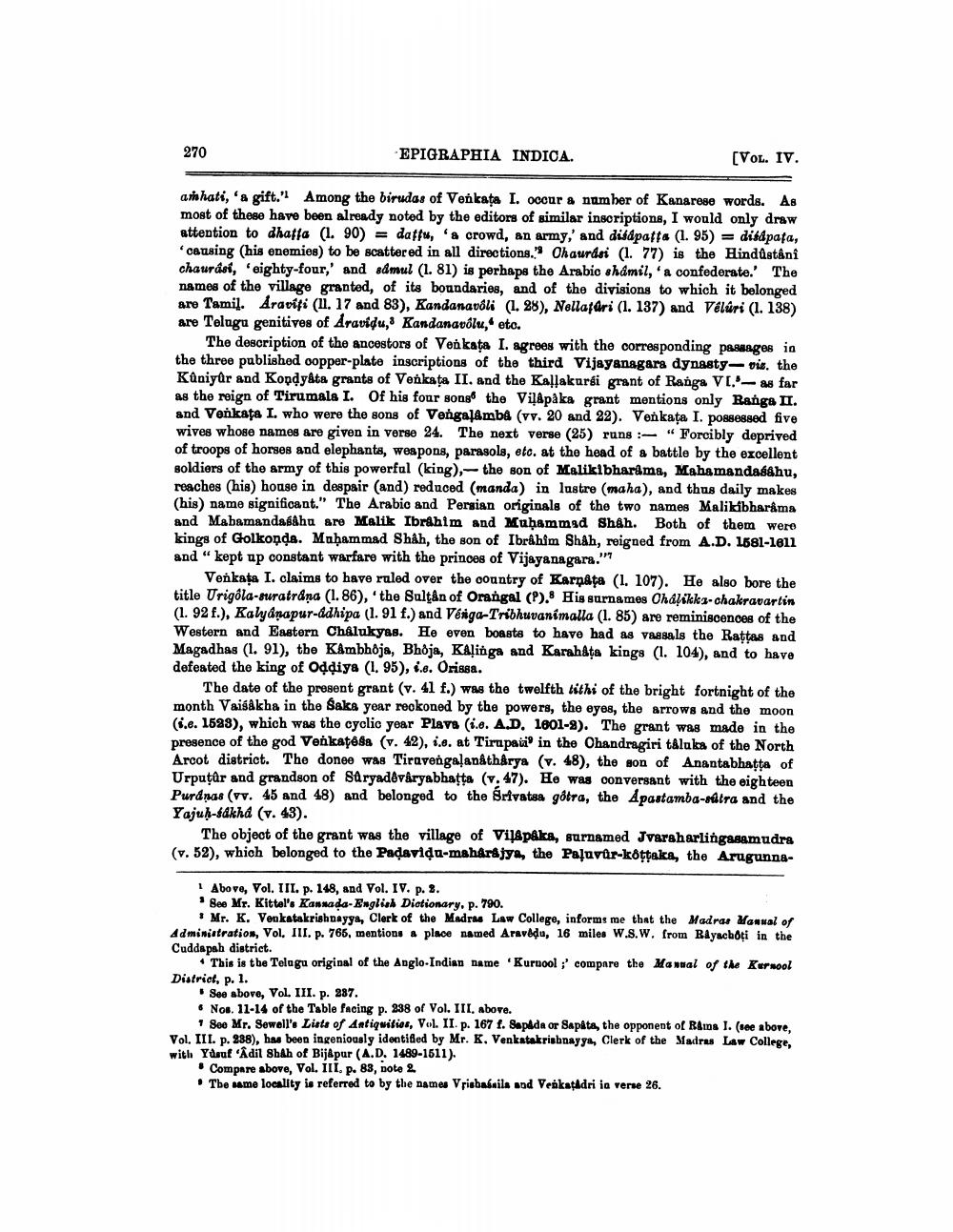________________
270
EPIGRAPHIA INDICA.
(VOL. IV.
anhati,'a gift." Among the birudas of Venkata I. occur a number of Kanarose words. As most of these have been already noted by the editors of similar inscriptions, I would only draw attention to dhatta (l. 90) = dattu, 'a crowd, an army,' and disapatta (1. 95) = ditapata,
causing (his enemies) to be scattered in all directions. Ohaurdai (1. 77) is the Hindustani chaurasi, eighty-four,' and sdmul (1. 81) is perhaps the Arabic shamil, 'a confederate.' The names of the village granted, of its boundaries, and of the divisions to which it belonged are Tamil. Araviti (11. 17 and 83), Kandanavoli (1.28), Nellafári (1. 137) and Vélúri (1. 138) are Telugu genitives of Aravidu, Kandanavõlu, eto.
The description of the ancestors of Venkata I. agrees with the corresponding passages in the three published copper-plate inscriptions of the third Vijayanagara dynasty-pis. the Kuniyûr and Kopdy&ta grants of Venkata II. and the Kallakursi grant of Ranga VI.'-as far as the reign of Tirumala I. Of his four song the VilApaka grant mentions only Ranga II. and Venkata I. who were the sons of Vengalamba (vv. 20 and 22). Venkata I. possessed five wives whose names are given in verse 24. The next verse (25) runs: "Forcibly deprived of troops of horses and elephants, weapons, parasols, etc. at the head of a battle by the excellent soldiers of the army of this powerful (king), the son of Malikibharama, Mahamandasahu, reaches (his) house in despair (and) reduced (manda) in lustre (maha), and thus daily makes (his) name significant." The Arabic and Persian originals of the two names Malikibharama and Mahamandabkha Sre Malik Ibrahim and Muhammad Shah. Both of them were kings of Golkonda. Muhammad Shah, the son of Ibrahim Shah, reigned from A.D. 1581-1811 and kept up constant warfare with the princes of Vijayanagara."
Venkata I. claims to have ruled over the country of Karnata (1. 107). He also bore the title Urigála-suratrana (1. 86), the Sultan of Orangal (P). His surnames Ohafikka-chakravartin (1. 92 f.), Kalyanapur-Adhipa (1.91 f.) and Vénga-Tribhuvanimalla (1. 85) are reminiscences of the Western and Eastern Chålukyas. He even boasts to have had as vassals the Rattas and Magadhas (1. 91), the Kambhôja, Bhoja, Kalinga and Karahata kings (1. 104), and to have defeated the king of Oddiya (1. 95), 6.8. Orissa.
The date of the present grant (v. 41 f.) was the twelfth tithi of the bright fortnight of the month Vaisakhs in the Saka year reokoned by the powers, the eyes, the arrows and the moon (i.e. 1529), which was the cyclic year Plavs (i.e. A.D. 1001-8). The grant was made in the presence of the god Venkatesa (v. 42), i.e. at Tirupacio in the Chandragiri taluka of the North Arcot district. The donee was Tiravengalanåthårya (v. 48), the son of Anantabhatta of Urputar and grandson of Saryadváryabhatta (v. 47). He was conversant with the eighteen Puranas (vv. 45 and 48) and belonged to the Srivatsa gôtra, the Apastamba-sitra and the Yajuḥ-fdkha (v. 43).
The object of the grant was the village of Vilapáka, surnamed Jvaraharlingasamudra (v. 52), which belonged to the Padavida-mshårsjy, the Palavûr-kottaka, the Arugunna
Abovo, Vol. III. p. 148, and Vol. IV. p. 8. Bee Mr. Kittel's Kannada-English Dictionary. p. 790.
Mr. K. Venkatakrishnayya, Clerk of the Madras Law College, informs me that the Madras Manual of Administration, Vol. III. p. 765, mentions a place named Aravedu, 16 miles W.S.W. from Bayachoţi in the Cuddapah district.
* This is the Telaga original of the Anglo-Indian name 'Kuruool;' compare the Manual of the Kernool District, p.1.
See above, Vol. III. p. 287. Nos. 11-14 of the Table facing p. 838 of Vol. III, above.
1 Soo Mr. Sewell's List of Antiquities, Vol. II. p. 167 1. Sapada or Sapta, the opponent of Rains I. (nee above. Vol. III. p. 988), hoe been ingeniously identified by Mr. K. Venkatakrishnayya, Clerk of the Madras Law College, with Yusuf Adil Shah of Bijapur (A.D. 1489-1611).
• Compare above, Vol. III. p. 83, bote 2 • The same locality lo referred to by the names Vriabaśnila and Venkatedri ia verse 26.




